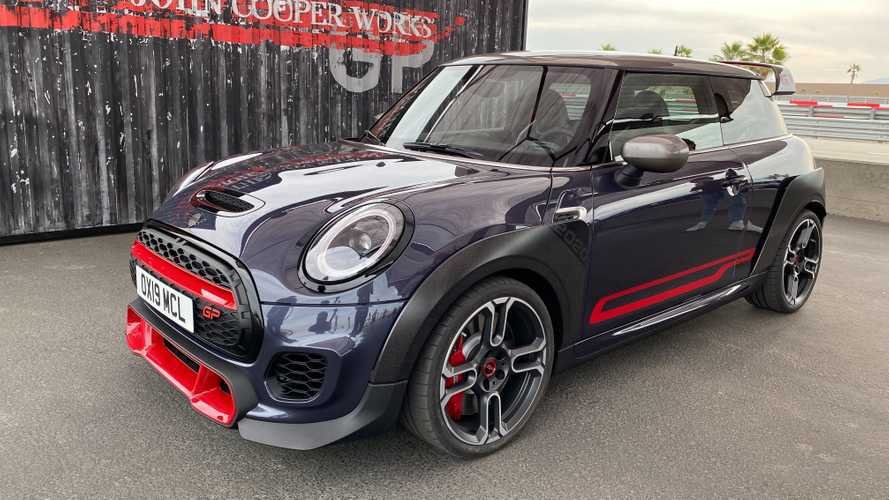The 2020 Mini John Cooper Works GP is overwrought and automatic

As we've said many, many times before: Nürburgring times are not the measuring stick automakers hold them out to be. They don't happen under controlled circumstances with independent observers and bone-stock cars, generally. So that makes the new 2020 Mini John Cooper Works GP's exact time – which BMW officially fudges as "under 8 minutes" and which spy shots peg at 7:56.69 – fairly meaningless. What's not meaningless are the optics. Regardless of whether others cheat, that time isn't particularly impressive, behind the likes of the Renault Megane R.S. Trophy-R, the Honda Civic Type R, and the Volkswagen GTI Clubsport.
Let's say, hypothetically, that all of those faster 'Ring runners were ... ringers. Maybe the Mini isn't. But strip away this stopwatch discussion and what remains is perhaps even more controversial. The John Cooper Works GP is a busy little thing, be-winged and spackled with GP decals and red accents and unusual overfenders. And it's an automatic – no manual here. Certainly all this will excite some, but it's bound to create some controversy for its sheer audaciousness.
Let's start with the styling. Deep, bright red accents abound, looking almost like enamel. The trim is otherwise darkened, even the badging. That large split wing above the rear hatch has a distinct sci-fi vibe, like it was ripped off the concept art for a 2042 fusion-powered race car. Whether it meshes with the loosely-defined retro vibe of the underlying Mini Cooper is up to you.
The most striking exterior element is the overfender treatment. They're a combination of a plastic understructure and a chopped carbon fiber material cap with a hexagonal seam motif. In pictures, it looks a bit like fiberboard – probably not the look Mini was going for. The panels stand proud of the fenders, too, especially at the top seam. If we're being generous, they look quite bold. But it seems that this element will live or die on how it appears in the flesh, so we'll wait until then to analyze it more.
The styling is going to create some polarization, and so too will the mechanical spec and performance numbers. The turbo inline-four makes 301 horsepower – respectable, sure, but not outlandish. The 0-60 time is off the pace compared to the superlative Civic Type R, which clocks a 4.7-second run according to Car and Driver (Honda is mum on 0-60 times, by the way). The GP? 5.0 seconds. Good, but not the best – just like its claimed 'Ring time. Its ungoverned top speed is 165 mph.
The engine is beefed up somewhat, with upgraded internals, a new turbo, and some revised cooling and oiling system changes – all to support the power rating and keep the engine healthy during spirited driving. But if you'd like a manual transmission, forget about it. The new GP is automatic-only, a torque converter eight-speed unit with an integrated locking differential and standard paddle shifters. At this point, a contemporary automatic isn't the performance penalty it once was, nor anathema to buyers, but it'll irk enthusiasts (who may or may not actually be in the market for one).
The interior is stripped-down as per its performance mission, with no rear seat and reduced sound deadening. Kudos to the company for not taking half measures here. The suspension is also serious stuff, lowered 0.4 inches and modified for increased camber. Stiffer bushings in some places help with rigidity, and the rear wishbones are mounted on stiffer ball sleeve joints instead of rubber bushings. Fourteen-inch front rotors clamped by four-piston calipers handle the majority of braking duties.
What we don't know is how this uprated Mini will fare in EPA fuel economy testing, not that anyone's going to lose sleep over its MPG numbers. We do know that it'll cost a formidable $45,750 when it hits showrooms in the middle of next year, limited to 3,000 units in total worldwide. Whether that figure, nearly $10,000 more than the harder-edged Civic Type R, will strike shoppers as a good deal is debatable. What's not debatable is that the JCW GP will make an impression wherever it goes.
